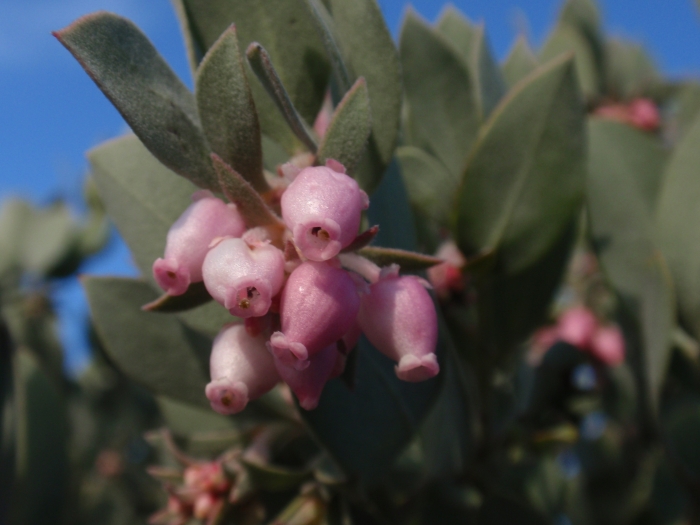Hoary Manzanita
(Arctostaphylos canescens)
Hoary Manzanita (Arctostaphylos canescens)
/
/

tom hilton
CC BY 2.0
Image By:
tom hilton
Recorded By:
Copyright:
CC BY 2.0
Copyright Notice:
Photo by: tom hilton | License Type: CC BY 2.0 | License URL: https://creativecommons.org/licenses/by/2.0 | Uploader: Stickpen | Publisher: Wikimedia Commons | Title: Arctostaphylos_canescens.jpg | Notes: |















































Estimated Native Range
Summary
Arctostaphylos canescens, commonly known as hoary manzanita, is a shrub native to the chaparral and woodlands of California, particularly in the Coast Ranges and the Sierra Nevada foothills. It exhibits a variable growth habit, ranging from a low, matted form to a more upright and spreading shape, reaching up to 2 meters (6.6 ft) in height. The smaller branches and twigs are covered in a layer of fine hairs, giving them a woolly appearance. The leaves are distinctive, being oval, pointed at the tip, and covered in a mix of woolly and waxy textures, measuring up to 5 centimeters in length. Hoary manzanita is notable for its dense clusters of whitish, urn-shaped flowers that are woolly inside, which bloom in the winter to early spring and are attractive to pollinators such as bees.
This species is valued for its ability to thrive in dry conditions, making it an excellent choice for water-wise gardens and xeriscaping. It is also used for erosion control on slopes due to its extensive root system. Hoary manzanita prefers full sun to part shade and does well in soils with medium to fast drainage. While it is drought-tolerant, it benefits from occasional deep watering during prolonged dry periods. Gardeners should be aware that this plant can be susceptible to root rot if overwatered or planted in poorly draining soils. Additionally, it may suffer from fungal diseases such as powdery mildew.CC BY-SA 4.0
This species is valued for its ability to thrive in dry conditions, making it an excellent choice for water-wise gardens and xeriscaping. It is also used for erosion control on slopes due to its extensive root system. Hoary manzanita prefers full sun to part shade and does well in soils with medium to fast drainage. While it is drought-tolerant, it benefits from occasional deep watering during prolonged dry periods. Gardeners should be aware that this plant can be susceptible to root rot if overwatered or planted in poorly draining soils. Additionally, it may suffer from fungal diseases such as powdery mildew.CC BY-SA 4.0
Plant Description
- Plant Type: Shrub
- Height: 3-6 feet
- Width: 1-2 feet
- Growth Rate: Moderate
- Flower Color: Pink, White
- Flowering Season: Spring, Winter
- Leaf Retention: Evergreen
Growth Requirements
- Sun: Full Sun, Part Shade
- Water: Very Low, Low
- Drainage: Medium, Fast
Common Uses
Bee Garden, Bird Garden, Butterfly Garden, Deer Resistant, Drought Tolerant, Groundcover, Hummingbird Garden, Low Maintenance, Rock Garden, Showy Flowers
Natural Habitat
Chaparral and woodlands of California, particularly in the Coast Ranges and the Sierra Nevada foothills
Other Names
Common Names:
Scientific Names: , Arctostaphylos canescens, Arctostaphylos canescens var. canescens, Arctostaphylos canescens f. candissima, Uva-ursi canescens,
GBIF Accepted Name: Arctostaphylos canescens Eastw.